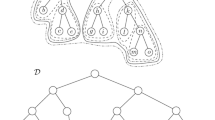Abstract.
Maxima in R d are found incrementally by maintaining a linked list and comparing new elements against the linked list. If the elements are independent and uniformly distributed in the unit square [0,1] d , then, regardless of how the list is manipulated by an adversary, the expected time is O(n log d-2 n) . This should be contrasted with the fact that the expected number of maxima grows as log d-1 n , so no adversary can force an expected complexity of n log d-1 n . Note that the expected complexity is O(n) for d=2 . Conversely, there are list-manipulating adversaries for which the given bound is attained. However, if we naively add maxima to the list without changing the order, then the expected number of element comparisons is n +o(n) for any \( d \ge 2 \) . In the paper we also derive new tail bounds and moment inequalities for the number of maxima.
Similar content being viewed by others
Author information
Authors and Affiliations
Additional information
Received January 7, 1997; revised June 20, 1997.
Rights and permissions
About this article
Cite this article
Devroye, L. A Note on the Expected Time for Finding Maxima by List Algorithms . Algorithmica 23, 97–108 (1999). https://doi.org/10.1007/PL00009256
Issue Date:
DOI: https://doi.org/10.1007/PL00009256




